The art of fermentation is something of a lost wonder. So many authors tell stories about the kitchen and fermentation; how it was standard practice to ferment. I am not one of the lucky few who saw fermentation first hand. I am thus not an expert in this field. Not even close. My journey in fermentation started when I started brewing beer in 2013. I then did a four-year course in philosophy. I stopped brewing beer (due to a lack of time and a drought in our region) and started baking sourdough bread. With this turn of events, I was thrown into the art of fermentation. But one may ask what do fermentation and philosophy have in common? The first clear thing that comes to mind is that it is a lifestyle.
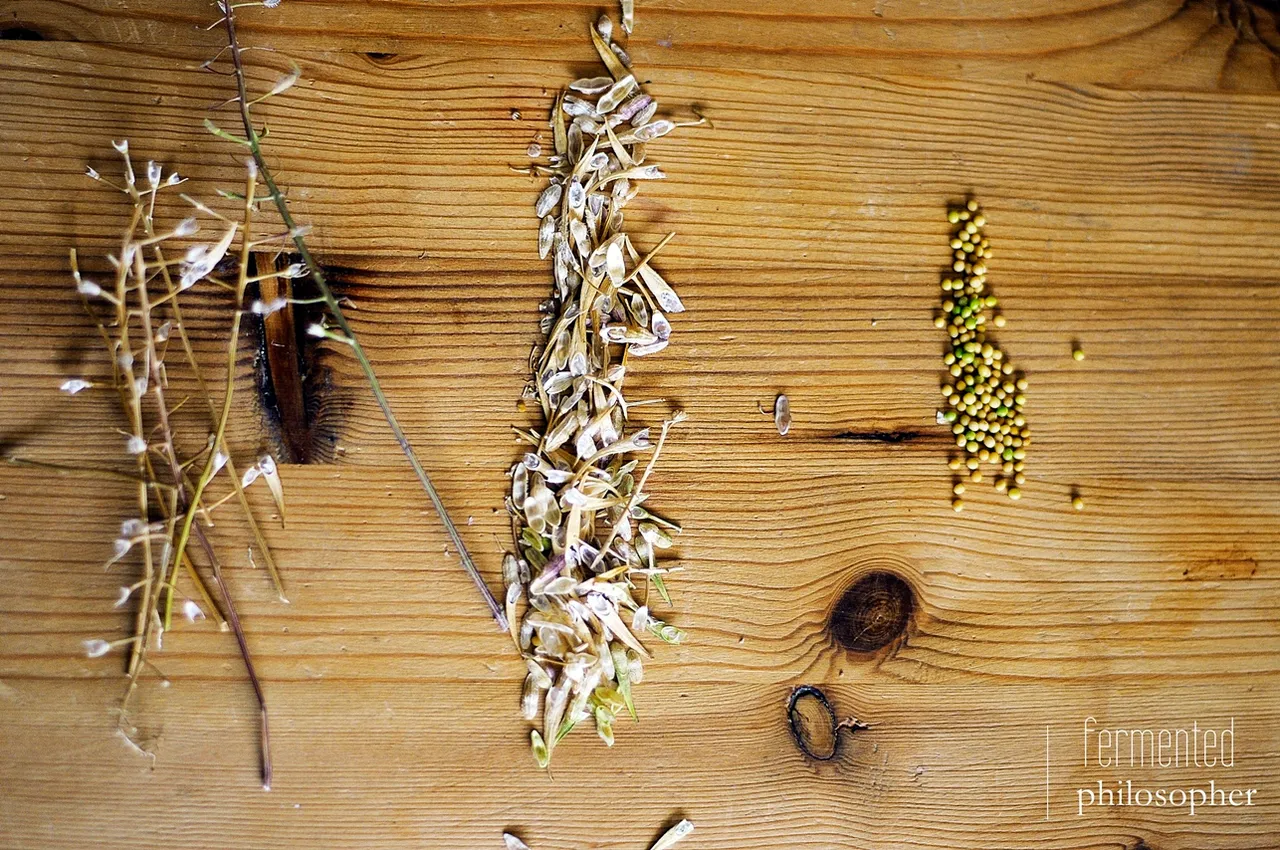
Why a lifestyle? See the above photo. It shows three stages; stages of life and death. On the left is the dead plant. In the middle is "vehicle", the house of the seed, the layer separating life from death. On the right is life; the small seed that harbours life. Growing any type of food is something special. We as a society have become detached from the growing process. We go to the store to buy either fresh or refined food. We never see how these foods are grown or processed. The post today will focus on mustard, so let's stick with mustard. The mustard seed is planted, a small plant comes up. This is the first part of the plant that can be used, or the first use of the plant. Microgreens are very popular, one of it being mustard greens. Once you use the microgreen it obviously destroys the plant so it cannot really grow further. The second use is thus letting the plant grow. In a week or two, the plant will be the microgreen. In the next couple of weeks or months, the plant will be bigger. The leaves can be used for salads or pestos. (My favourite is using basil, rocket and young mustard greens in my homemade pesto.) If you wait a couple of weeks more, you will see the flower of the plant: a bright yellow flower. Small pods will start to grow and once the plant dies, you can harvest the seeds. It is tedious work, but if you have the time, why not do it? You pick the pods, wait until it dries out, take a bunch in your hand and squeeze. The seeds will fall out and you are a step closer to something you did not have.
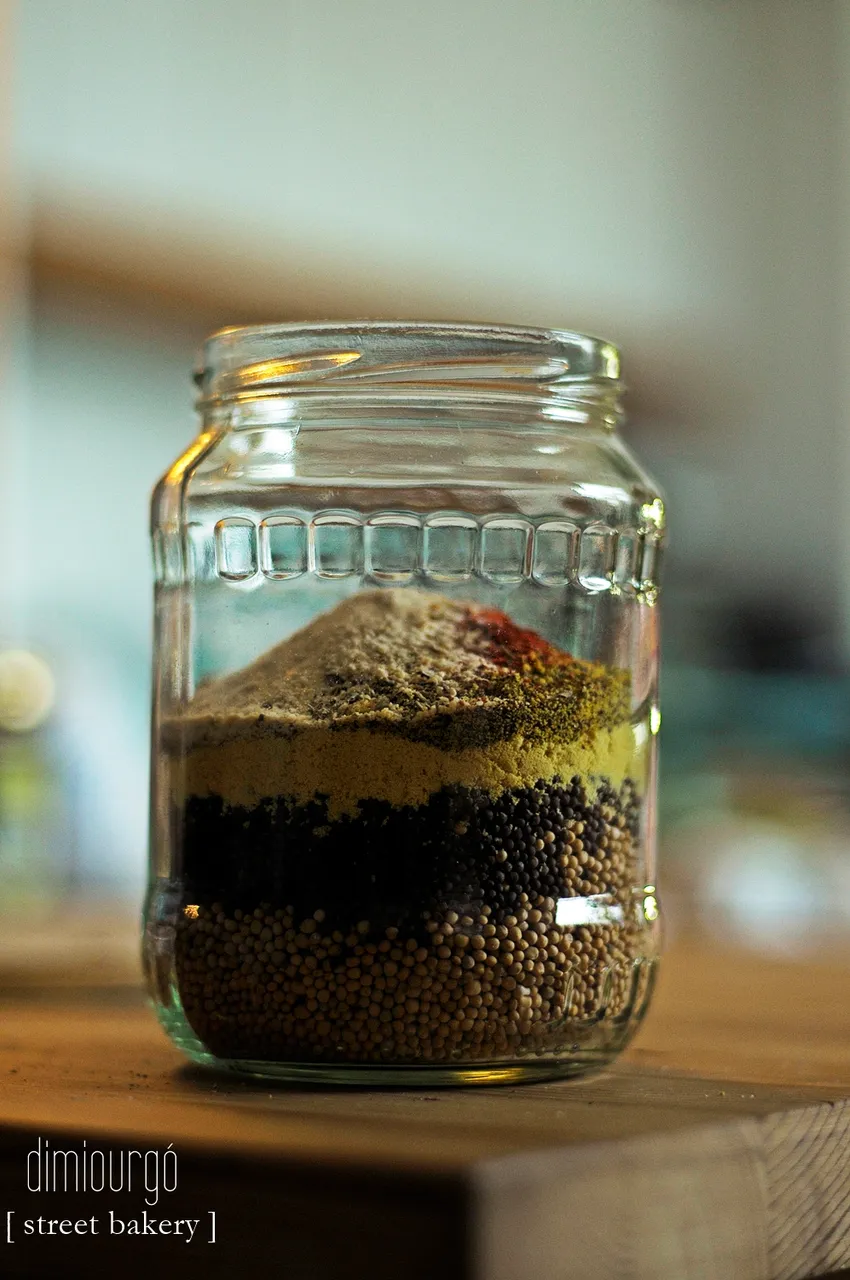
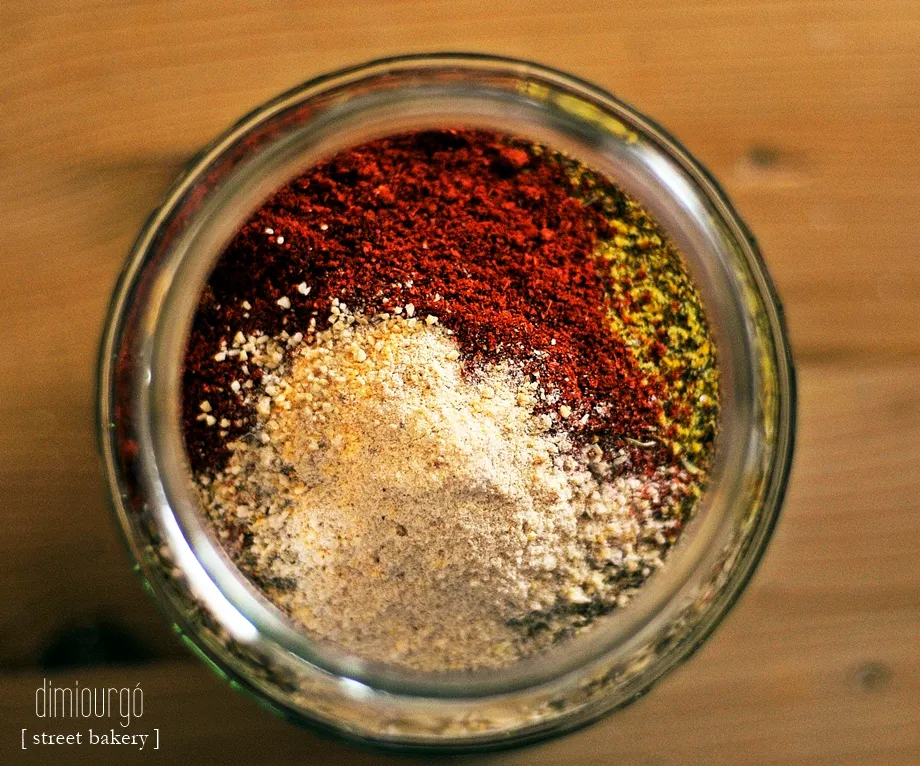
The seeds will dry out. You ground one half to a powder, the other half you keep whole. You mix other spices if you want to with the mustard. You throw vinegar on it, let it stand and soak the vinegar in. The smell of the mix is incredible. The second stage is blending it. The third stage is leaving it to "age" a bit.
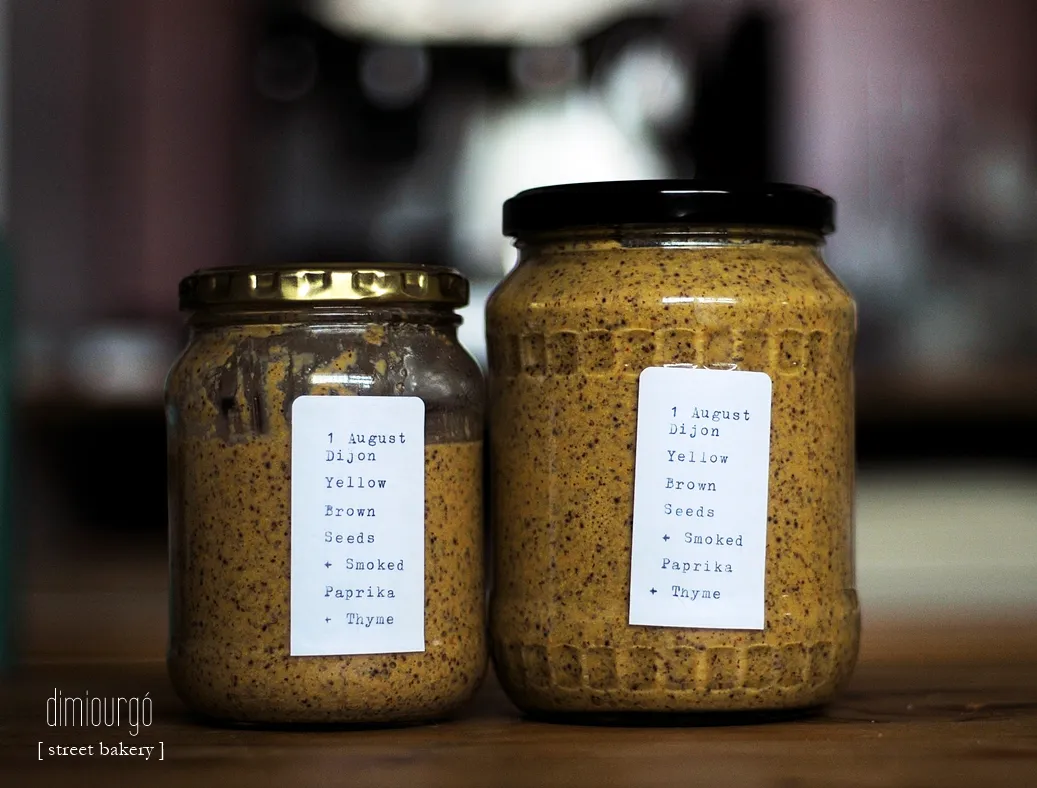
And the last stage is this lengthy process is opening the bottle after a week of ageing and eating it. It won't taste the same as the bottle in the store. It will taste like your own work. Even if it is not the best thing you tasted in the world, you made something. You are better than most people who do not even know how mustard is made, or even how the plant looks like.
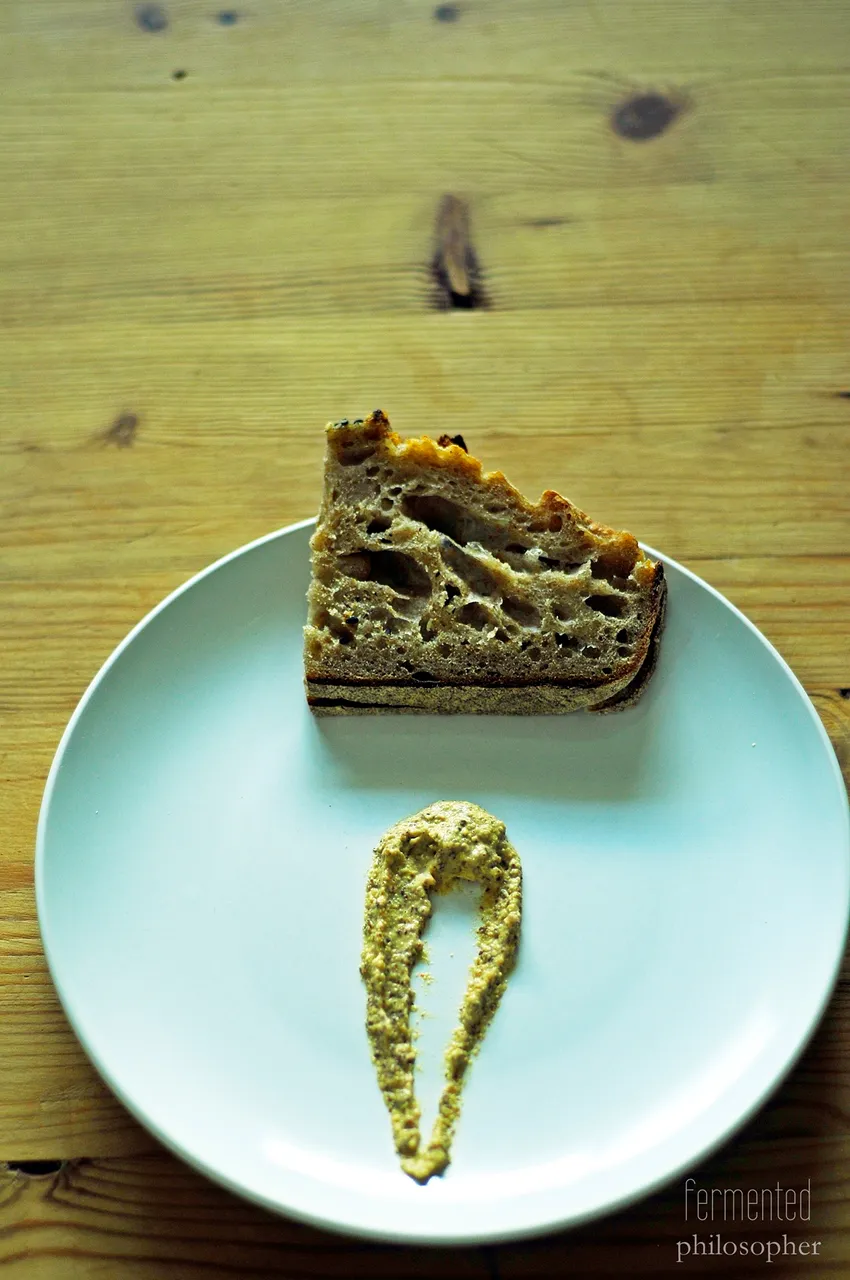
I must admit that mustard is technically not fermented in the normal way, or in other words, the normal way of making mustard does not use fermentation. It uses fermented products. I use vinegar and white wine. These are fermented products that make the mustard. You can easily add whey or something in that line to ferment the mustard and the call it fermented mustard. I further eat the mustard on sourdough (fermented) bread. The combination is something I fell in love with.
The question then can be asked (again) what does fermentation have to do with philosophy? What does growing mustard have to do with a lifestyle and philosophy? This is a complex question, one that I will try to answer in a series of different posts over the next couple of months. One cannot answer it in a satisfactory manner just yet. But I can try to. The first problem is philosophy as a lifestyle. The ancient Greeks harboured this lifestyle. I am no expert in this field, but to my knowledge philosophy of today is vastly different from that practised in ancient times. Philosophy then as a lifestyle is not something you do per se, but something you live. It is a lifestyle, but don't ask me how that lifestyle looks like. I myself identify as a sceptic (not in a doubtful sense, more in a questioner and researcher way). I started brewing beer (and baking bread and making my own mustard) because I was sceptical about the fact that I need to buy it from a mass-produced bunch. But let us not venture on that path. I hope I answered that question in a way.
The second question then is something like what does fermentation have to do with lifestyle? Somewhere above I talked about growing food as a lifestyle. It boils down to the fact that once you start to learn how things are grown and made, you will want to make it yourself. (I can already hear some people shouting that this is not so or this is not for them. Yes, it is not for everyone, otherwise we all would have lived on a farm or something.) The lifestyle part is just that it becomes part of who you are, and how you will come to see life. Life is just that: abundant with life. As a living creature, you would want to be part of life, you will want to get your hands dirty with soil, you will want to see a mustard plant grow until it is ready to harvest the seeds. Making and growing your own food will become a lifestyle.
But now the hardest part, why is philosophy and fermentation brought up in the same sentence or thought? I want to identify three parts. Firstly, fermentation takes something and changes it. Secondly, fermentation makes that something better (and more nutritious). Thirdly, that something that is better is broken down into a more manageable size. If you take fermented mustard for example. Firstly, you start with mustard seeds and powder, vinegar and wine. During fermentation, these products change and turn into mustard. The fermentation process also breaks down cell walls and all those stuff I do not know off, but all I know it makes the mustard, for example, more digestible. I hope the similarities between philosophy and fermentation is clear now. Firstly, the philosopher sits with a problem (for example the empirical experiences he/she have). Secondly, something similar to fermentation happens when the philosopher changes the empirical experiences into something else. This is normally done by contemplating a problem, sitting for hours and thinking about it, or just using previous knowledge to "digest" the problem. Thirdly, the problem is digested, fermented, changed into something more manageable. The philosopher then acts like the process of fermentation. The philosopher is fed something, it is changed, and it then becomes more manageable. (This is obviously oversimplified.)
A last similarity can be stated. This is not always the case (especially not with mustard, I think). Fermentation is used to preserve food. Two statements can be made. Firstly, food is thus preserved by using fermentation. But secondly, it can age. With ageing, something can also become more complex and better ("more" better than stated earlier). This first two examples that pop into my head is wine and whisky. Both these products are aged to improve the taste. Fermentation is used to make a better product, but ageing improves the product even more. Now the same can be said about philosophy. The philosopher takes in the "raw" world and preserve it with his/her subjective experience thereof, but also puts it into a state that can be "aged". One can easily say this about the Greek philosophers. We still read them today, we are still influenced by their thoughts. (One should not think that Greek philosophers are better than say, Asian or African philosophers, I just don't have any experience in them.) Their thoughts and words are like a well-aged wine or whisky. Maybe in a thousand years, our current philosophers will be read. Or maybe the three-thousand-year-old work of Plato/Socrates will be even better, aged for another thousand years.
These thoughts are still young, like a freshly fermented wine or small mustard plant. It is still in a developmental phase. I will work on it, I will age it a bit. I will drink a well-aged whisky, read some Plato or Seneca, drink some homemade beer, eat a slice of sourdough bread with mustard while watering my mustard plants. Maybe I will discard every thought I had, maybe I'll further this journey. Time will tell. If you read up until here, I hope to hear from you, I hope that you will correct my thoughts or agree with me. Let us ferment our current thoughts.